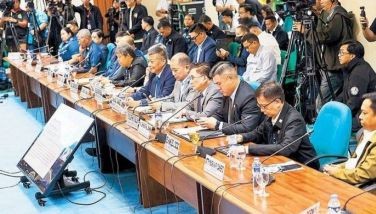Parens patriae

By now, the Energy Regulatory Commission (ERC) should have realized that it committed a huge mistake that has proven extremely costly for power consumers.
In August last year, San Miguel Global Power (SMGP) sought from the ERC an increase in the rates of its two fixed-rate power supply agreements (PSAs) with the Manila Electric Co. (Meralco), translating to a net rate impact on Meralco of 28 centavos per kilowatt hour, to be collected for a period of six months only.
The temporary power rate hike, sought jointly by SMGP and Meralco for the Sual coal and Ilijan natural gas power plants, would allow SMGP to recover only one third of the P15-billion in losses which the two plants have incurred since 2021 due to skyrocketing global coal prices and the natural gas supply restrictions from the Malampaya gas field.
It was the only way by which SMGP can preserve the fixed-rate PSAs since under the said agreements, if the company encounters changes in circumstances that are beyond its control, it is allowed to terminate the agreements with Meralco.
Meralco submitted computations to the ERC to show that the rate hikes being sought offered the best possible and least cost scenarios. ERC’s own regulatory operations service did not dispute this.
Inspite of this, ERC said no, with the commission being split on the matter and deciding to deny the petitions after its chair broke the impasse and voted to deny the increase.
ERC likewise ordered that PSAs be implemented, even if this means continuing massive losses for the two power plants.
The Court of Appeals 13th Division earlier granted the petition for writ of preliminary injunction filed by SMGP unit South Premiere Power Corp. (SPPC) that will suspend the implementation of the PSA for the 670-megawatt Ilijan plant. This means that the PSA’s implementation is suspended pending a ruling on the main petition seeking to allow the termination of the agreement permanently.
In the meantime, the CA directed SPPC and Meralco to enter into good faith negotiations that will amend the terms of the 10-year PSA based on change in circumstances.
But San Miguel Energy Corp, also a unit of SMGP, failed to get an order from the CA 16th Division to suspend the ERC’s Sept. 29, 2022 order for the coal-fired power plant in Sual.
The main petitions have been consolidated with the CA 16th division.
Had the ERC decided in favor of SMGP and Meralco’s petitions six months ago, the six-month period to collect the proposed increase in power rates would have been finished by now and SMGP would be back to implementing the lower power rates under the PSAs inspite of the still rising costs of coal and natural gas.
But since ERC said no, Meralco consumers are now forced by circumstances to continue paying rates much higher than the 28 centavo per kwh increase that was being asked for since Meralco has no choice but to get the power it needs from other sources that offer higher prices.
And we are set to continue paying higher indefinitely, because new emergency power supply deals are being pegged at the sky-high fuel rates triggered by the Russia-Ukraine war--which the ERC said did not consider as a change in circumstances for SMGP.
Observers agree that the ERC failed to uphold the interests of one of the country’s key power producers, and to protect consumers from higher electricity prices. As parens patriae or parent of the country, the government has failed miserably in this respect.
There are those who mistakenly and maliciously blame San Miguel for the higher power rates.
Worse, some have turned to cyberspace and have created a website calling San Miguel as the biggest fossil gas developer in Southeast Asia, and saying that its latest brew is dirty, overpriced energy. A long-time hater of SMC, a group called Center for Energy, Ecology and Development, proudly claims that it is the one supporting the page.
The SMC Group is not the only power company in the Philippines that uses liquefied natural gas (LNG) to run its plants. It is also not the biggest user. It is in fact the Lopez Group for power generation.
Even President Marcos expressed his full support of a partnership between Lopez-owned FirstGen and Tokyo Gas that would build an LNG terminal facility in Batangas, even as he emphasized that the growing share of LNG in the country’s energy mix indicates that the country is on the right path.
The Department of Energy also estimates that the country’s natural gas consumption could reach between 18,000 to 24,000 megawatts by 2040 from the current 2,011 MW.
If they hate dirty energy, why aren’t these haters saying anything about coal? Why aren’t they saying anything about other LNG users?
Eu gives nod to Philippine seafarers certificate
Filipino seafarers aboard European Union-flagged ships no longer have any reason to worry.
This was after the European Commission (EC) decided to continue recognizing certificates for seafarers issued by the country, one of the world’s largest maritime labor supplier.
EC Commissioner for Transport Adina Valean earlier welcomed efforts by Philippine authorities to improve the system for training and certifying of seafarers. There are around 50,000 Filipino masters and officers currently working on EU-flagged ships.
President Marcos welcomed the EC’s decision, even as he reaffirmed his administration’s promise to prioritize the local maritime industry and provide the sector with all the necessary support.
Transport Secretary Jaime Bautista said the Philippine maritime training and certification system will continue to be recognized by the EC as it extended recognition of the country’s compliance to the International Convention on Standards for Training, Certification and Watchkeeping (STCW) for seafarers.
Bautista noted the Maritime Industry Authority’s relentless efforts with other stakeholders to promote the welfare of Filipino seamen even as he gave assurance that the Philippines, through the DOTr and MARINA, will continue to work for this purpose.
Meanwhile, Department of Migrant Workers Secretary Toots Ople commended Bautista for his work toward accelerating reforms in the maritime sector.
Back in 2021, the EC informed the Philippines that recognition of seafarer certificates would be withdrawn unless serious measures were taken, including compliance with the STCW.
But since then, the EC said that the Philippines has made serious efforts to comply with the to comply with the requirements, particularly in key areas like monitoring, supervision and evaluation of training and assessment.
For comments, e-mail at mareyes@philstarmedia.com
- Latest
- Trending































